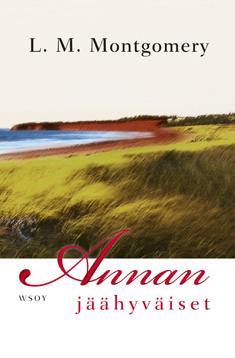Although the paperback edition of The Blythes Are Quoted and the new edition of Rilla of Ingleside aren’t technically scheduled for publication until 26 October, copies are already available through Amazon.ca! I’m also told by my local independent bookstore, Words Worth Books, that copies will be available there by Friday, at which point I’ll stop in to sign them. I expect that copies will trickle into various bookstores across the country between now and next Tuesday, so keep your eyes peeled!
Category: L.M. Montgomery
I’ll be giving a paper at next weekend’s Conference on Editorial Problems at the University of Toronto. This year’s conference is hosted by the Editing Modernism in Canada (EMiC) project. My paper, “Editing L.M. Montgomery across the Scholarly/Trade Divide,” discusses the challenges and dilemmas involved in putting together editions of Montgomery’s work that follow scholarly editorial principles while remaining accessible to her wide range of readers.
Gisele M. Baxter’s review of The Blythes Are Quoted and of Philip Roy’s book Journey to Atlantis appears in Canadian Literature #205, the Summer 2010 issue, available now! Read it here.
When putting together The Blythes Are Quoted near the end of her life, L.M. Montgomery repeated the strategy she had used when putting together Chronicles of Avonlea three decades earlier: she rewrote existing stories about unrelated characters and locations in order to include mentions of and brief appearances by Anne. In looking for material that could be reworked for Anne and her family, Montgomery selected not only some of her short stories published throughout the 1930s, but also a few that she was not able to publish.
Three of the short stories were published in Family Herald and Weekly Star, a Montreal farm magazine, and the first short story in the book is also the earliest. “Some Fools and a Saint” was published in its original form in Family Herald and Weekly Star in four installments in May and June 1931; this version was also reprinted in the collection of short stories Among the Shadows: Tales from the Darker Side. The original version of “Fool’s Errand” followed in February 1933, and the original version of “An Afternoon with Mr. Jenkins” appeared in August 1933. Note that these stories in their original form had nothing to do with Anne, the Blythes, or the community of Glen St. Mary.
Three more stories were published elsewhere throughout the 1930s. Several more appear in Montgomery’s records of her income as a writer, indicating that they were in fact published in the original form, but we haven’t yet been able to determine where. Three of the short stories, though, don’t appear on Montgomery’s ledger: “The Pot and the Kettle,” “The Reconciliation,” and “Retribution.” Was their inclusion in The Blythes Are Quoted an attempt by Montgomery to salvage work that was deemed too controversial for magazine publication?
Ever read Rilla of Ingleside and wonder what is meant by “fruitatives,” “ANZACs,” “Banshee,” “battalion runner,” “Black Sunday,” or “cootie sarks”? Or what happened at the Battles of Aisne, Cambrai, Caporetto, Courcelette, Marne, or New Chapelle, or in the Canadian election of 1917? Or the role played in the First World War by Herbert Asquith, Sir Robert Borden, Sir Julian Byng, Constantine of Greece, Nicholas II, Sir Samuel Hughes, or Woodrow Wilson? The new edition of L.M. Montgomery’s Rilla of Ingleside includes a detailed glossary with over 330 entries, from literary allusions and cultural customs to significant dates, locations, and events related to the First World War.
A little while ago today I received from Penguin Canada advance copies of Rilla of Ingleside and of the paperback edition of The Blythes Are Quoted, both of which go on sale on October 26. They both look wonderful, and I can’t wait to hear the reactions and impressions of Montgomery’s devoted readers.
The Blythes Are Quoted contains forty-one poems attributed to Anne Shirley Blythe and to her son Walter Blythe, who in Rilla of Ingleside goes off to fight in the Great War. Many of these poems were published in periodicals under Montgomery’s name from the early 1920s onward. One exception is “The Old Path Round the Shore,” which was first published much earlier, in a magazine called The Household Ledger, in 1903. “The Piper,” the first poem that appears in the book, was submitted by Montgomery to Saturday Night magazine three weeks before her death, and was published posthumously in the 2 May 1942 issue.
This new edition of Rilla of Ingleside includes the full text of the original 1921 edition. In the 1970s, a reprint edition silently cut 4,500 words, or 4% of the original text. That edition was reprinted by Bantam-Seal in the 1980s and remains in print today.
Announcing new Facebook pages for The Blythes Are Quoted and Rilla of Ingleside! Get all the latest information about these new editions, chat with the editors and with fellow readers, and help spread the word!

Here at last is the cover art for the Finnish edition of The Blythes Are Quoted, entitled Annan jäähyväiset and published today by WSOY.